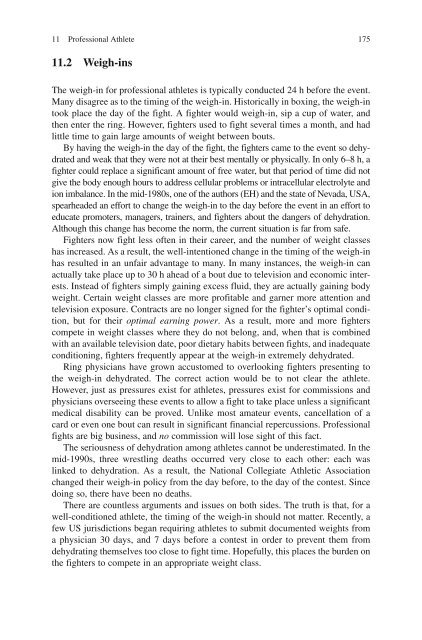Nutrition in Combat Sports
Nutrition in Combat Sports
Nutrition in Combat Sports
Create successful ePaper yourself
Turn your PDF publications into a flip-book with our unique Google optimized e-Paper software.
11 Professional Athlete 175<br />
11.2 Weigh-<strong>in</strong>s<br />
The weigh-<strong>in</strong> for professional athletes is typically conducted 24 h before the event.<br />
Many disagree as to the tim<strong>in</strong>g of the weigh-<strong>in</strong>. Historically <strong>in</strong> box<strong>in</strong>g, the weigh-<strong>in</strong><br />
took place the day of the fight. A fighter would weigh-<strong>in</strong>, sip a cup of water, and<br />
then enter the r<strong>in</strong>g. However, fighters used to fight several times a month, and had<br />
little time to ga<strong>in</strong> large amounts of weight between bouts.<br />
By hav<strong>in</strong>g the weigh-<strong>in</strong> the day of the fight, the fighters came to the event so dehydrated<br />
and weak that they were not at their best mentally or physically. In only 6–8 h, a<br />
fighter could replace a significant amount of free water, but that period of time did not<br />
give the body enough hours to address cellular problems or <strong>in</strong>tracellular electrolyte and<br />
ion imbalance. In the mid-1980s, one of the authors (EH) and the state of Nevada, USA,<br />
spearheaded an effort to change the weigh-<strong>in</strong> to the day before the event <strong>in</strong> an effort to<br />
educate promoters, managers, tra<strong>in</strong>ers, and fighters about the dangers of dehydration.<br />
Although this change has become the norm, the current situation is far from safe.<br />
Fighters now fight less often <strong>in</strong> their career, and the number of weight classes<br />
has <strong>in</strong>creased. As a result, the well-<strong>in</strong>tentioned change <strong>in</strong> the tim<strong>in</strong>g of the weigh-<strong>in</strong><br />
has resulted <strong>in</strong> an unfair advantage to many. In many <strong>in</strong>stances, the weigh-<strong>in</strong> can<br />
actually take place up to 30 h ahead of a bout due to television and economic <strong>in</strong>terests.<br />
Instead of fighters simply ga<strong>in</strong><strong>in</strong>g excess fluid, they are actually ga<strong>in</strong><strong>in</strong>g body<br />
weight. Certa<strong>in</strong> weight classes are more profitable and garner more attention and<br />
television exposure. Contracts are no longer signed for the fighter’s optimal condition,<br />
but for their optimal earn<strong>in</strong>g power . As a result, more and more fighters<br />
compete <strong>in</strong> weight classes where they do not belong, and, when that is comb<strong>in</strong>ed<br />
with an available television date, poor dietary habits between fights, and <strong>in</strong>adequate<br />
condition<strong>in</strong>g, fighters frequently appear at the weigh-<strong>in</strong> extremely dehydrated.<br />
R<strong>in</strong>g physicians have grown accustomed to overlook<strong>in</strong>g fighters present<strong>in</strong>g to<br />
the weigh-<strong>in</strong> dehydrated. The correct action would be to not clear the athlete.<br />
However, just as pressures exist for athletes, pressures exist for commissions and<br />
physicians oversee<strong>in</strong>g these events to allow a fight to take place unless a significant<br />
medical disability can be proved. Unlike most amateur events, cancellation of a<br />
card or even one bout can result <strong>in</strong> significant f<strong>in</strong>ancial repercussions. Professional<br />
fights are big bus<strong>in</strong>ess, and no commission will lose sight of this fact.<br />
The seriousness of dehydration among athletes cannot be underestimated. In the<br />
mid-1990s, three wrestl<strong>in</strong>g deaths occurred very close to each other: each was<br />
l<strong>in</strong>ked to dehydration. As a result, the National Collegiate Athletic Association<br />
changed their weigh-<strong>in</strong> policy from the day before, to the day of the contest. S<strong>in</strong>ce<br />
do<strong>in</strong>g so, there have been no deaths.<br />
There are countless arguments and issues on both sides. The truth is that, for a<br />
well-conditioned athlete, the tim<strong>in</strong>g of the weigh-<strong>in</strong> should not matter. Recently, a<br />
few US jurisdictions began requir<strong>in</strong>g athletes to submit documented weights from<br />
a physician 30 days, and 7 days before a contest <strong>in</strong> order to prevent them from<br />
dehydrat<strong>in</strong>g themselves too close to fight time. Hopefully, this places the burden on<br />
the fighters to compete <strong>in</strong> an appropriate weight class.

















